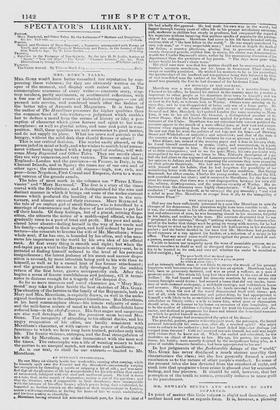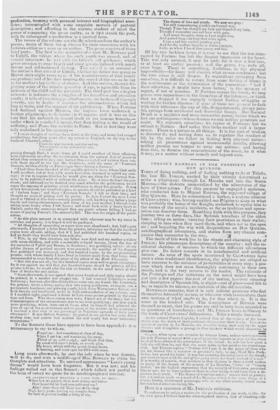production, teeming, with personal interest and biographical anec- dotes; intermingled
with some exquisite morsels of pastoral description; and affording to the curious student of mind the power of comparing the prose reality. as it first struck the poet, with its subsequent reproduction in a poetical form.
The verses of the volume are chiefly selections from the author's poems, many of them being chosen fur their connexion with his fortunes either as a mall 4ur an author. The prose consists of three brief parts. The first is tats narrative of a visit Mu. BOWLES paid to Uphill, the village where his early youth 'vat, passed, and of i:everal interviews he lit I \ ith his father's old gardener; which gives occasion to some fmtily and rural gossip, imbued with much devout and old-fashioned feeling. The stied:itl is an account of the author's first are: al at Uphill, whither his father was going as Rector sixty-eight ■ ears of his reminiscences of that family emigration ; and of his first hearing the sound of the sea as he lay in his mother's lap in the p .st-chnise. And this section, though dis- playing some of the minute g aridity of age, is agreeable from its mixture of the child and the pata larch. The third part has a higher interest : it indicates the struggles of his friendless and penniless youth; it tells of two unli:trpy attachine;,ts, me broken off through poverty, one by death : it teicratee the circumstanees which led him to write, and the manlier of his publication. When Fortune had declared against Hymen, the hapless lover undertook a foreign pilgrimage, to dissipate leis thoughts: and it was on this tour that his melancholy vented itself in his famous Sonnets,— tinder which is couched a moral, that deep feeling is the result of suffering, and Peace the sacrifice to Fame. But at first they were only embalmed in his memory-
" I never thought of v: ruing them down at the time, and many had escaped recollection ; but three years after my return to England, on my way to the banks of Cherwell, where
I bade the pipe farewell. and that sad lay tthu.rnur,ie.int my us:lam:holy oat:,
I mted; '
passing through Bath, I wrote down all I could recollect of these effusiocs, most elaborately mending the versification front the natural flow of music in which they occurred to ate ; and, having thus cwwected and written them out, took them myself to the late Mr. Cruttweli, with the name of Fourteen Sonnets, written chiefly on Picturesque Spots during a Journey.' "I had three times kuocked at this amiable primer's door, whose kind smile I still recollect, and at last, with much 'resit aim], ventured to unfold my mes- sage : it was to inquire whether he would give any thing fur ' Fourteen Son- nets,' to be published with or without the name. Ile at once declined the pur- chase; and informed me he doubted very much whether the publication would repay the expense of printing, which would come to about five pounds. It was at last determined, one hundred copies, in quarto, should be published as a kind of ' forlorn hope; and these ' Fourteen Sonnets' I left to their fate ; and thought no more of getting rich by poetry. la fact, I owed the meat I ever owed at Oxford at this time—seventy pounds ; and, knowing my father's large family and trying circumstances, and those of my poor mother, I shrunk from asking more money when I left home ; and went back with a heavy heart to Oxford, under the conscious weight that, my poetic scheme failing, I had no means of paying Parson's (the mercer's) bill. This was the origin of the publi- cation.
"As this plain account is so connected with whatever may be my name in criticism and poetry, it is hoped it will be pardoned.
" All thoughts of succeeding as a poet were now abandoned ; but, half a year afterwards, 1 received a letter from the printer, informing me that the hundred copies were all sold, adding, that if I had published five hundred copies, he had no doubt they would have been sold also. " This, in my then situation, my father now dead and my mother a widow with seven children, and with a materially reduced income, (from the loss of the rectories of Uphill and Bream, in Somerset,) was gratifying indeed : all my golden dreams of poetical success were renewed ; the number of the Sounets first published was increased, and five hundred copies, by the congratulating printer, with whose family I have lived in kindest amity from that hour, were recommended to issue front the press of the editor of the Both Chronicle.
"But this was not all ; the live hundred copies were sold to great advautage; for it was against my will that fire hundred copies should be printed, till the printer told me he would take the tisk on himself, on the usual terms at that time of bookseller and author.
" Soon afterwards, it was agreed that seven hundred and Arty copies should be printed, in a smaller and elegant size. I had received Coleridge's warm testimony ; but soon after this third edition carne out, my friend, Mr. Cruttwell, the printer, wrote a letter, saying that two young gentlemen, strangers, one a particularly handsome and pleasing youth, lately from Westminster School, and both literary and intelligent, spike in high commendation of my volume, and, if I recollect right, expressed it desire to have some poems printed in the same type and form. Who these young men were, I knew not at the time; but the communication of the circumstance was to me most gratifying; and how much more gratifying, when, from one of them, after he himself had achieved the fame of one of the most virtuous and elevent of the writers in his generafloa, I received a first visit at my parsonage in Wiltshire upwards of forty years afterwards! It was Robert Southey : ese parted in my garden last year, when stealing time and sorrow had marked his still manly but must interistin countenance."
To the Sonnets these hues appear to have been appended : it is unnecessary to say to whom.
Forget me; but sometimes at close of day,
When I am kn.: and wanderiug far away, Think of me with a sigh ; and think that then, By sonic wild river's brink, or woody glen, My heart, which still thy gentle image bears, Is heaving, and mine eyes are fili'd with tears.
Long years afterwards, he met the lady when he was famous, well to do, and with a middle-aged Mrs. Bowess to claim his thoughts and attentions. To outward appearances " Love's young dream" would have been forgotten. But it was not; and his feelings welled out in this Sonnet; which (albeit not partial to the form of verse) we quote for its autobiographical interest.
ON ACCIDENTALLY MEETING A LADY NOW NO 31011::.
When last we parted, thou were young and fair- Ilow beautiful let fond remembrance say !
Alas! since then old Time has stolen away Nigh forty, years, leaving my temples bare. So hath it perished—like a thing of air, The dream of love and youth. We now are gray : Yet still remembering youth's enchanted way, Though Time has changal my look and hlanch'd my hair, Though I remember one sail hour with pain, And never thought—long as I yet might live, And parted long—to hear that voice again, I can a sad but cordial greeting give, And for thy welfare breathe as warm a prayer, Lady, as When I loved thee young and fair.
Of his two luckless loves, it is easy to see that the one inter- rupted by Fortune has left the deepest impression on his heart. This was only natural, it may be said; for it was a first love, or at least an earlier passion ; and the grave, t to, ends all, even hope. There is something, doubtless, in the physical impossibility—for fancy will cherish what reason condemns : but the true cause is still deeper. In separations springing front ourselves, it is difficult to escape from some feeling of blame in the continuance or the terminatiou of the connexioa " had I done otherwise, it might have been better," is the memory of regret, if not of remorse. It' Fortune causes the break, we may grieve over imprudence in the formation of the intimatey, or think that we dropped it too supinely without further struggles or waitin., for further chances : if nurse of these are present to dash with their bitterness the cup of life, disappointment, always pain- ful, springs from accidental and dross-like things. But Natural Death is a mightier and more inexorable power, before, which we feel our nothingness—whose decrees we can neither penetrate nor resist. We reproach ourselves; we repine at Fortuae: but we submit to Nature. And under this lurks another and a larger moral. There is a nature in all things. It is the part of wisdom to discover it ; and having done so, to regulate the conduct of life by the rules we follow in dealing with physical nature ; taking all precautions against unsuccessful results, allowing neither passion nor temper to sway our actions : and having done this, to dismiss the remembrance of the event, be it what it may, as a matter without remedy and beyond care.



























 Previous page
Previous page